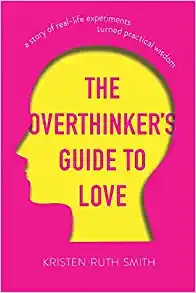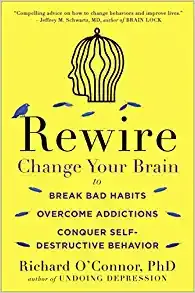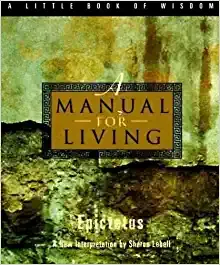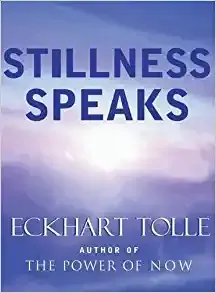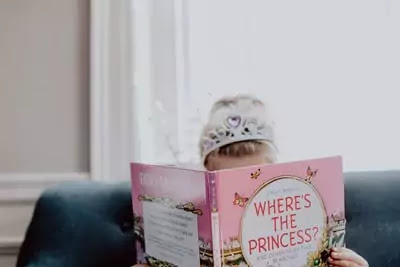What books can you read to relieve stress, anxiety, and overthinking?
Reading can help relieve stress, anxiety, and overthinking. Here are some types of books to read:
- Self-help books: These books provide many practical methods and techniques to help people cope with anxiety and depression. For example, "Cognitive Behavioral Therapy: Basic Principles and Applications" and "How to Calm Down When You Lose Emotions" etc.
- Psychology books: These books teach a lot about mental health, including the causes, symptoms, and treatments of anxiety and depression. For example, "Human Behavioral Psychology" and "Psychology and Life" etc.
- Fiction books: These books allow readers to temporarily forget their worries and immerse themselves in the storyline. For example, "Pride and Prejudice" and "The Little Prince" etc.
- Biographical books: These books can provide readers with inspiration and encouragement by learning about other people's experiences of overcoming anxiety and depression. For example, "The Biography of Steve Jobs" and "Living the Meaning of Life" etc.
No matter which type of book you choose, it is important to choose content that suits you and maintain a positive attitude during the reading process.
It’s no secret that we live in an increasingly stressful world. The cost of living crisis, climate change, the blurring of boundaries between work and home life... people are feeling more stressed and exhausted than ever before, and we have become accustomed to it.
Yet it’s at times like this that books can help. We have compiled the following list of books that are full of useful information. Each book is written by an expert author, hoping to help you relieve anxiety, stress, and fatigue.
1. The Worry Trick

The Worry Trick by David A. Carbonell PhD
Are you truly in danger or has your brain simply "tricked" you into thinking you are? In The Worry Trick, psychologist and anxiety expert David Carbonell shows how anxiety hijacks the brain and offers effective techniques to help you break the cycle of worry, once and for all.
Anxiety is a powerful force. It makes us question ourselves and our decisions, causes us to worry about the future, and fills our days with dread and emotional turbulence. Based on acceptance and commitment therapy (ACT) and cognitive-behavioral therapy (CBT), this book is designed to help you break the cycle of worry.
Worry convinces us there's danger, and then tricks us into getting into the fight, flight, or freeze mode—even when there is no danger. The techniques in this book, rather than encouraging you to avoid or try to resist anxiety, show you how to see the trick that underlies your anxious thoughts, and how avoidance can backfire and make anxiety worse.
If you’re ready to start observing your anxious feelings with distance and clarity—rather than getting tricked once again—this book will show you how.
2. Clear Your Mind

Clear Your Mind by Steven Schuster
Feel like a hamster on a wheel, endlessly overwhelmed by your own thoughts and noisy brain? Do you lack focus on what’s important and feel daily anxiety? If you want clarity and peace of mind, this book is for you.
All of us deal with an excessive amount of expectations surrounding us about what to do with our lives: become richer, lose weight, be a better person, think more positively, more… We have so many expectations, obligations, and duties and not enough energy to keep up with them. But do we really?
Your greatest barrier to a better life is your own mind. The solution you’re seeking is right in front of you. Clear Your Mind will help you to understand your thoughts, organize them, and attach the appropriate action to them. Mental clarity equals peace of mind.
The goal of this book is simple: free your mind from destructive thoughts, help you adopt new, constructive habits, and release you from tension. Your mind becomes more creative once released from burdens.
This book will tell you:
- How can you stop overthinking
- How to let go of others’ expectations (and your own)
- The main causes of mental clutter
- How to stop talking and start acting
- How to rephrase your negative thoughts Clarity of mind releases you from stress and anxiety.
- Understand how your brain works – biologically and psychologically
- Make better decisions by knowing what you actually want
- Learn the benefits of top-down thinking
- How to release mental energy by minimizing social media involvement
What if I told you all the mental clarity and cognitive potential you longed for to know how to improve your life resided in you all along like a pearl waiting to be discovered?
Clear Your Mind is a manual for those who feel defeated, who resigned long ago, a manifesto for true life change by unleashing your mental genius. Life isn’t as complicated as we are made to think, and it is time for you to discover why.
3. The Overthinker’s Guide to Love
The Overthinker’s Guide to Love by Kristen Ruth Smith
The Overthinker's Guide to Love offers hard-won insight turned into straightforward practices for anyone seeking a satisfying partnership in an increasingly complex landscape of relationship and sexuality.
Like so many millennials, Kristen assumed dating, marriage, and sex would come naturally someday, but nearing thirty and still without a clear sexual compass, she leans on her curiosity and intellect to think her way into partnership by turning her life into a Love Laboratory, candidly offering up her observations through a series of earnest, comical, and intimate real-life experiments that challenge the ways we define the world of relationship, commitment, intimacy, and love.
Complete with data analysis and experiments readers can run at home, her combination of sincere storytelling and teaching reminds us that discovering who we are in love should be playful, fun, and always up for investigation.
4. Unf#ck Your Brain

Unf#ck Your Brain by Faith G. Harper, Ph.D. LPC-S ACS ACN
A no-nonsense and helpful guide on how to cope with a slew of mental-health issues that are hellbent on ruining the lives of millions of people worldwide.
Our brains do their best to help us out, but every so often they can be real assholes―having meltdowns, getting addicted to things, or shutting down completely at the worst possible moments. Your brain knows it’s not good to do these things, but it can’t help it sometimes―especially if it’s obsessing about trauma it can’t overcome. That’s where this life-changing book comes in.
With humor, patience, science, and lots of good-ole swearing, Dr. Faith explains what’s going on in your skull, and talks you through the process of retraining your brain to respond appropriately to the non-emergencies of everyday life, and to deal effectively with old, or newly acquired, traumas (particularly post-traumatic stress disorder).
This is by far the most fu*k and sh*t book I've read. (Of course, I suspect the same is true of several other books in the same series by the author) But they are still number one on Amazon's bestseller list. The content is easy to understand and the style is purely colloquial. I have read a lot of psychology books and nothing new to me. But it should still be useful for readers with few basics.
5. Reclaim Your Brain
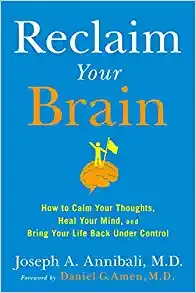
Reclaim Your Brain by Joseph A. Annibali, M.D.
A prescriptive guide to restoring cognitive calm, based on Amen Clinics chief psychiatrist Dr. Joseph Annibali’s three decades of treating patients who suffer from overloaded, overstimulated brains.
Dr. Joseph Annibali has treated thousands of people with overloaded, overstimulated brains. Some people describe their brains as being “in chaos”; others feel that their brain is “on fire.”
But whether they are ultimately diagnosed with anxiety, disabling OCD, depression, bipolar disorder, or even substance abuse, the underlying problem is a Too-Busy Brain, a great irritant that interferes with attention, concentration, focus, and mood, and often much more. It may even be a sign of undetected damage to either the brain or the body itself.
But through practical strategies, understandable explanations, and prescriptive mind-management techniques, Dr. Annibali will help readers finally reclaim their brains and get back in control of their lives.
6. The Body Keeps The Score
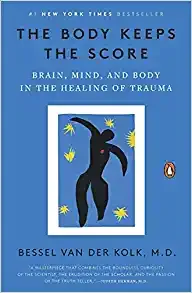
The Body Keeps The Score by Dr. van der Kolk
It took me more than two weeks to finally read this book (the content is not obscure, but it is a lot of information, and there are many technical terms of brain science, which I have difficulty understanding).
Combined with the anxiety training for teenagers organized by the Oriental Hospital in mid-July and the follow-up of the Jingwei Center in early August, this summer vacation enlightened my understanding of the integration of medicine and education.
Dialogue work and non-verbal communication of assessment may bring about development and changes from the perspective of brain science; on the other hand, it begins to understand the responsibilities and boundaries of a school psychologist from a physiological point of view, as well as psychiatrists and psychologists to school mental health staff. expectations.
While Dr. Van der Cock has expressed concern about whether his years of research efforts will bring about real-world change (for example, his years of work to add "developmental trauma disorder" to DSM-5 have so far been unsuccessful), the book ends with "symptoms." is a source of strength” and that “social change comes from traumatic experiences” remains heartening.
I look forward to more medical education and related colleagues reading this book, and an open attitude towards each other will bring the possibility of deep integration.
It is basically a must-read in the field of trauma. The theoretical and practical parts are very comprehensive and well-understood, and the clinical experience shared by the author is also very interesting.
I'm very interested in EMDR, neurofeedback, and internal family therapies, although they feel like they're all amazing -- EMDR has shown very strong evidence in the literature,
the latter two are... Of course, the book also discusses why the latter two are limited evidence. In short, I feel that after reading it, I can only accept the problem from the perspective of developmental trauma.
Finally, I would like to say that brain science and neuroscience are really amazing, and we will wait and see more new developments!
The recommended reading after the book feels great, learn slowly and read slowly.
7. My Grandmother's Hands
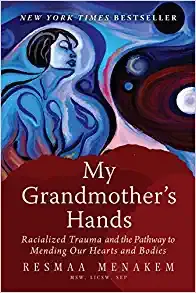
My Grandmother's Hands: Racialized Trauma and the Pathway to Mending Our Hearts and Bodies by Resmaa Menakem
In this groundbreaking book, therapist Resmaa Menakem examines the damage caused by racism in America from the perspective of trauma and body-centered psychology.
The body is where our instincts reside and where we fight, flee, or freeze, and it endures the trauma inflicted by the ills that plague society. Menakem argues this destruction will continue until Americans learn to heal the generational anguish of white supremacy, which is deeply embedded in all our bodies. Our collective agony doesn't just affect African Americans. White Americans suffer their own secondary trauma as well. So do blue Americans—our police.
My Grandmother's Hands is a call to action for all of us to recognize that racism is not only about the head, but about the body, and introduces an alternative view of what we can do to grow beyond our entrenched racialized divide.
- Paves the way for a new, body-centered understanding of white supremacy—how it is literally in our blood and our nervous system.
- Offers a step-by-step healing process based on the latest neuroscience and somatic healing methods, in addition to incisive social commentary.
Resmaa Menakem, MSW, LICSW, SEP, is a leading voice in today’s conversation on racialized trauma and the creator of Cultural Somatics, which utilizes the body and its natural resilience as mechanisms for growth.
As a therapist and the founder of Justice Leadership Solutions, a leadership consulting firm, Resmaa dedicates his expertise to coaching leaders through civil unrest, organizational change, and community building.
8. Brain Food: How to Eat Smart and Sharpen Your Mind

Brain Food: How to Eat Smart and Sharpen Your Mind by Lisa Mosconi
How to eat for maximum brain power and health from an expert in both neuroscience and nutrition.
Like our bodies, our brains have very specific food requirements. And in this eye-opening book from an author who is both a neuroscientist and a certified integrative nutritionist, we learn what should be on our menu.
Dr. Lisa Mosconi, whose research spans an extraordinary range of specialties including brain science, the microbiome, and nutritional genomics, notes that the dietary needs of the brain are substantially different from those of the other organs, yet few of us have any idea what they might be.
Her innovative approach to cognitive health incorporates concepts that most doctors have yet to learn. Busting through advice based on pseudoscience, Dr. Mosconi provides recommendations for a complete food plan, while calling out noteworthy surprises, including why that paleo diet you are following may not be ideal, why avoiding gluten may be a terrible mistake, and how simply getting enough water can dramatically improve alertness.
Including comprehensive lists of what to eat and what to avoid, a detailed quiz that will tell you where you are on the brain health spectrum, and 24 mouth-watering brain-boosting recipes that grow out of Dr. Mosconi's own childhood in Italy, Brain Food gives us the ultimate plan for a healthy brain.
Brain Food will appeal to anyone looking to improve memory, prevent cognitive decline, eliminate brain fog, lift depression, or just sharpen their edge.
9. Just Eat It
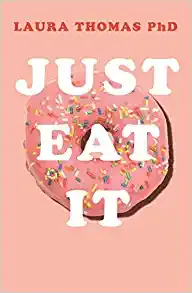
Just Eat It by Laura Thomas
Just Eat It isn't just a book. It's part of a movement to give women power and control over their bodies. To free us from restrictive dieting, disordered eating, and punishing exercise. To reject the guilt and anxiety associated with eating and, ultimately, to help us feel good about ourselves.
"Truly life-changing" Dolly Alderton, bestselling author of Everything I Know About Love
This anti-diet guide from registered nutritionist Laura Thomas Ph. D. can help you sort out your attitude toward food and ditch punishing exercise routines. As a qualified practitioner of Intuitive Eating - a method that helps followers tune in to innate hunger and fullness cues - Thomas gives you the freedom to enjoy food on your own terms.
There are no rules: only simple, practical tools and exercises including mindfulness techniques to help you recognize physiological and emotional hunger, sample conversations with friends and colleagues, and magazine and blog critiques that call out diet culture.
So, have you ever been on a diet? Spent time worrying that you looked fat when you could have been doing something useful? Compare the size of your waistline to someone else's? Felt guilt, actual guilt, about the serious crime of . . . eating a doughnut? You're not alone. Just Eat It gives you everything you need to develop a more trusting, healthy relationship with food and your body.
10. Rewire: Change Your Brain
Rewire: Change Your Brain by Richard O'Connor
Richard O’Connor’s bestselling book Undoing Depression has become a touchstone in the field, helping thousands of therapists and patients overcome depressive patterns.
In Rewire, O’Connor expands those ideas, showing how we actually have two brains—a conscious deliberate self and an automatic self that makes most of our decisions—and how we can train the latter to ignore distractions, withstand temptations, and interrupt reflexive, self-sabotaging responses.
Rewire gives readers a road–map to overcoming the most common self-destructive habits, including procrastination, excessive worrying, internet addiction, overeating, risk-taking, and self-medication, among others.
By learning valuable skills and habits—including mindfulness, self-control, confronting fear, and freeing yourself from mindless guilt—we can open ourselves to vastly more successful, productive, and happy lives.
11. Stop Overthinking
GET IT ON AMAZON
GET IT ON BOOKSHOP.ORG
Stop Overthinking: 23 Techniques to Relieve Stress, Stop Negative Spirals, Declutter Your Mind, and Focus on the Present by Nick Trenton
Stop Overthinking is a book that understands what you've been through, the exhausting situation you've put yourself into, and how you lose your mind in the trap of anxiety and stress.
Acclaimed author Nick Trenton will walk you through the obstacles with detailed and proven techniques to help you rewire your brain, control your thoughts, and change your mental habits.
What's more, the book will provide you scientific approaches to completely change the way you think and feel about yourself by ending vicious thought patterns.
Stop agonizing over the past and trying to predict the future.
Nick Trenton grew up in rural Illinois and is quite literally a farm boy. His best friend growing up was his trusty companion Leonard the dachshund. RIP Leonard. Eventually, he made it off the farm and obtained a BS in Economics, followed by an MA in Behavioral Psychology.
Powerful ways to stop ruminating and dwelling on negative thoughts.
- How to be aware of your negative spiral triggers
- Identify and recognize your inner anxieties
- How to keep the focus on relaxation and action
- Proven methods to overcome stress attacks
- Learn to declutter your mind and find focus
Unleash your unlimited potential and start living.
12. A Manual for Living
A Manual for Living by Epictetus
The essence of perennial Stoic wisdom in aphorisms of stunning insight and simplicity. The West's first and best little instruction book offers thoroughly contemporary and pragmatic reflections on how best to live with serenity and joy.
Out of all existing things some are in our power some are not; exercise what’s in our power otherwise, you will be frustrated. What disturbs your mind is not events but your judgments on events. Behave in life as you would at a banquet.
13. Stillness Speaks
Stillness Speaks by Eckhart Tolle
In Stillness Speaks, best-selling author Eckhart Tolle illuminates the fundamental elements of his teaching, addressing the needs of the modern seeker by drawing from all spiritual traditions.
At the core of the book is what the author calls "the state of presence," a living in the "now" that is both intensely inspirational and practical. When the pressures of future and past thinking disappear, fear and frustration also vanish, conquered by the moment.
Stillness Speaks takes the form of 200 individual entries, organized into 10 topic clusters that range from "Beyond the Thinking Mind" to "Suffering and the End of Suffering." The entries are concise and complete in themselves, but, read together, take on a transformative power.
14. The Untethered Soul
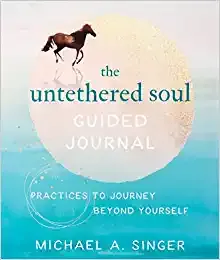
The Untethered Soul by Michael A. Singer
I read this book from "The Surrender Experiment". During the reading process, I felt that many of the views in the book are very reasonable and practical. During the reading process, I can really experience my own development and development in my daily life. peaceful.
The summary is as follows, and I hope to share it with you:
Step -1
Recognizing the separation of the ego from the self-experience, the ego is the master experiencer, and all feelings are the existence of an object. Establishing this witness' subject consciousness and thinking framework can completely change our understanding of life.
Step - 2
Life is a flow of energy, trying to feel this flow of energy in itself. If you are trapped by experience, you will unconsciously try to protect yourself against this flow of energy; at this time you will close your heart, then these energies will not flow smoothly but will stagnate in your heart and become a knot. And once you have a knot, you will do everything possible to avoid touching it, so you will no longer be free.
Step - 3
Practice exercises to keep an open mind so that energy can flow continuously; no one is perfect, when the knot formed by past experience is touched again, it will inevitably cause pain, try to stop and relax by yourself, and let the energy flow naturally through the body. Only in this way can you truly be freed from your ego cage and gain true freedom.
Step - 4
When you feel the anxiety and fear caused by external things, it means that they have touched your inner limit, which is the inner wall of self-imposed limits. At this time, don't avoid it, and bravely extend outwards, so that you can gain a more open inner world.
Step - 5
Choose unconditional happiness, happiness is an inner choice and should not be based on any external conditions. Accept anything that has happened, don't resist external things or your own feelings, avoid all kinds of extremes, and seek to achieve a state of inner balance, so that the energy can deal with various things more efficiently.
Letting things take their course doesn't mean you don't deal with what's happening, accept what's happening, and let any experience pass through your body so that you're not dealing with the emotion or the experience, but with the thing itself.
15. Women Who Think Too Much

Women Who Think Too Much: How to Break Free of Overthinking and Reclaim Your Life by Susan Nolen-Hoeksema
It's no surprise that our fast-paced, overly self-analytical culture is pushing many people―especially women―to spend countless hours thinking about negative ideas, feelings, and experiences.
Renowned psychologist Dr. Susan Nolen-Hoeksema calls this overthinking, and her groundbreaking research shows that an increasing number of women―more than half of those in her extensive study―are doing it too much and too often, leading to sadness, anxiety, and depression.
She challenges the assumption―heralded by so many pop-psychology pundits of the last several decades―that constantly expressing and analyzing our emotions is a good thing.
In Women Who Think Too Much, Nolen-Hoeksema shows us what causes so many women to be overthinkers and provides concrete strategies that can be used to escape these negative thoughts, move to higher ground, and live more productively. Women Who Think Too Much will change lives and is destined to become a self-help classic.
16. Embrace the Chaos

Embrace the Chaos: How India Taught Me to Stop Overthinking and Start Living by Bob Miglani
In this inspiring book, Miglani shares the experiences and encounters that helped him finally get it.
- What happens when you find yourself in an Indian village with no money and a plane to catch?
- How could an educated urban woman agree to a marriage after two dates?
- What keeps a rural health worker motivated despite the enormous need and such limited ability to help?
- What does trying to catch an insanely overcrowded bus teach you about perfection?
Embracing the chaos, Miglani found that, “leads us down paths we never would have walked on...It brings out strengths we never knew existed inside of us.”
17. The Noonday Demon: An Atlas of Depression by Andrew Solomon
Solomon titled his book The Atlas of Depression, and once you're halfway through the book, you'll start to understand why it's a great book:
The book is an encyclopedia of depression, Here's everything you want to know about depression, including personal experiences, medical experiences, medications, history, cultural explanations, and, of course, Solomon's own history with depression.
There is a lot to understand and comprehend in this book. It has two major selling points. One is that it is well written, and the other is that Solomon’s own story is shocking.
Truth be told, I have been reading books about depression and mental health for years. I have even suffered from mild depression myself. I had no idea that depression could be so harmful to the body.
This is the only book I have ever read that made me understand why a person would choose to end his or her life.
The Noonday Demon changed a lot of what I thought about depression, including antidepressants, therapy, and mental health. If you read this book when you are depressed, it will give you more hope and help you out.
18. First, We Make the Beast Beautiful by Sarah Wilson
Personally, I thoroughly enjoyed this book, but I don't think everyone will enjoy it. Because not everyone can accept Wilson's writing style or rather the way her brain works.
Like a chronically anxious person, the style of the entire book
"First, We Made the Beasts Beautiful" is frenetic, often jumping from one story to another, and the last second we were still telling 10 What happened a year ago has already opened up my imagination for the next five years in the next,
second, from narrating childhood to imagining old life, from personal ups and downs to scientific research to the experience I learned from my meditation teacher, by the way, these experiences are completely ineffective. But now that I think about it, it's still funny.
I love it because my brain and the way I write sometimes work the same way. But I saw some anxious people commenting online that they became more anxious after reading this book—obviously, this defeats the purpose of this sharing.
All that aside, I think this book best shows how someone with severe anxiety can live with it and find a way to function and thrive in life.
Wilson suffered from bipolar disorder, an eating disorder, manic episodes, and intermittent depression, and anxiety was a constant companion.
Sarah's anxiety is rooted in her. She couldn't shut it out, but she used it to become braver, more creative, and land a great position.
I have always believed that the key to eliminating anxiety is not to get rid of it but to channel it more effectively.
It's this same idea at the heart of First We Made the Beast Beautiful, demonstrated through a vibrant and even slightly crazy approach to life that's unlike anything I've encountered before.
19. Feeling Good: The New Mood Therapy by David Burns
Godwin's Law famously states that the longer any online discussion goes on, the closer to 100% the chance someone will be compared to Hitler.
Well, in my experience, the longer an online discussion about depression, anxiety, or any other mental health issue goes on, the closer to 100% the likelihood that they will be given a recommendation on "how to feel good about yourself." I see people mention this book quite often.
This book introduces in detail how to face negative thinking, procrastination, loneliness, fear, anger, and other emotions, how to use tables to analyze your own emotions and thoughts, and how to alleviate anxiety problems from a cognitive level.
This is because if you were to write a comprehensive book, there would be enough exercises in it to fill a small notebook and make you feel good.
Burns did an amazing job essentially writing a "substitute" that was the closest thing to a real therapist.
So whenever I meet someone who needs a psychiatrist but can't find one for some reason, this book is my second choice.
20. The Happiness Trap: How to Stop Struggling And Start Living by Russ Harris
I really enjoyed this book. This book had a huge impact on me when I read it many years ago, and I was very upset when I discovered that I had inadvertently "plagiarized" an exercise from the book's self-awareness chapter. (But I have since corrected it and quoted it correctly.)
Harris is perhaps the most visible proponent of ACT (Acceptance and Commitment Therapy). ACT is a relatively new form of treatment that believes the key to dealing with depression, anxiety, or addiction is not necessarily eliminating the bad feelings.
Instead, ACT focuses on developing mental tools and good habits to more effectively defend against these unwanted emotions. CBT (Cognitive Behavioral Therapy) focuses on channeling pain and suffering into more effective interpretations and actions, whereas ACT just says, screw it, bad feelings are bad feelings, and if we don’t allow them to happen, they’re useless. Meaningless.
To me, ACT is one of the more promising recent developments in psychology because it combines some of the benefits of mindfulness with an infusion of Eastern philosophy.
The Happiness Trap is one of the most accessible and enjoyable psychology books ever written. The writing is clear and interesting, and the exercises engaging.
In my opinion, the best pop psychology books are humorous and humane, and this book is one of the few that does that well.
21. Self-Compassion: The Proven Power of Being Kind to Yourself by Dr. Kristin Neff
In The Subtle Art of Not Giving a Fuck, I make the point that true self-esteem cannot be measured by how a person feels about his or her own success; it must be measured by how we feel about our own success. measured by feelings of failure.
This is not a very new idea. People have been degrading self-esteem for decades. But Neff was the first psychologist to conceptualize an alternative measure of self-esteem: one that equates self-esteem to self-compassion.
Self-compassionate people can withstand failure, forgive themselves for messing up, accept their insecurities and shortcomings, and keep trying.
Ignore the cheesy title here. Every time you hear someone say, “Hey, don’t be so hard on yourself,” self-compassion will give you answers and solutions.
In this book, Neff proposes that self-compassion is a more effective measure of mental health and examines how we can get there.
How do we cultivate self-compassion? How do you forgive yourself for messing up and not living up to your expectations?
Are we constantly failing and frustrated and nothing seems to go right? Please be sure to read this book, you will find these answers.
Like many pop psychology books, her examples and anecdotes can sometimes seem a bit corny.
However, the central idea of the book is very important, and if you are one of those crazy self-critical types, this book is still worth reading.
22. Unwinding Anxiety by Dr Judson Brewer
Have you ever had this experience? Anyone who has ever stared at the ceiling at three in the morning with increasingly anxious thoughts swirling around in their head will be familiar with the anxiety "cycle" described in this book.
In "Unlocking Your Anxiety Habit", psychiatrist and neuroscientist Dr. Brewer use his 20 years of research results to explain to readers the causes of anxiety addiction and ways to get out of this vicious cycle.
Although this book is rooted in scientific research, it is also easy to read and the steps mentioned in it are practical and can be integrated into daily life.
23. How to Calm It by Grace Victory
This book belongs to Merky's 'How To...' series. It is an introductory book on how to further relax. In the book, Grace Victory describes ways to focus on things you can control.
This self-help healing book emphasizes self-love and helps readers set boundaries, talk about making time for the things they enjoy, and take more care of themselves during difficult times.
This book also contains a very practical interactive section, where readers can record their key insights at any time in the note-taking area.
24. The Little Book of Calm by Aaron Balick
The page count of this small book may be a little thin - only 128 pages - but this does not affect the weight of its contents. Dr Aaron Balick has over 20 years of professional experience as an academic and psychotherapist.
His "Little Book of Calm" is "full of" exercises that can help readers reduce worry and anxiety.
The subtitle of "Taming Anxiety, Facing Fear, and Living with Freedom", it provides many ways to stay calm in the dilemmas of daily life. It is a good remedy to help readers put the anxiety problem in perspective.
Stress Relief Books
25. Why Has Nobody Told Me This Before? by Dr. Julie Smith
Despite the title, there's a good chance someone has already recommended this book to you.
Clinical psychologist Dr Julie Smith has amassed a large following on TikTok, where she offers a variety of therapy tips, from setting boundaries to stepping out of your comfort zone.
Her best-selling book Why Didn't No One Tell Me Earlier? ” was published last year and became a word-of-mouth success.
The simple and easy-to-follow guidance in the book can help readers solve problems such as managing stress, building self-confidence, and overcoming low mood.
26. The Stress Solution by Dr. Rangan Chatterjee
On how to achieve a calmer and more confident state of life, Dr. Rangan Chatterjee points out four aspects that need attention in this book: goals, relationships, body, and mind.
He recommends healthy tips for each area, from how to breathe healthier to how to find and ignite your passions.
Although none of the methods recommended by Dr Chatterjee seem to require much effort, the effects they can produce are likely to be far-reaching.
27. The Seven-Day Stress Prescription by Dr Elissa Epel
As Dr Elissa Epel admits in this book, there is no magic prescription to make stress go away. She instead advocates that people change their relationship with stress—and that this transformation can be accomplished in just seven days.
Using some simple scientific techniques, Dr Epel shows readers how to become more flexible, identify the things they can control, and let go of the rest.
This book can be very effective in changing your perspective on stress and learning to handle high-pressure situations.
28. The Practice of Not Thinking by Ryunosuke Koike
You've probably heard of the term "mindfulness," but if you're a bit out of tune with the apps and YouTube videos, it might be time to listen to Ryunosuke Koike's advice.
In his book, the former monk argues that we can retrain our brains to focus on our senses rather than the cacophony of thoughts, incorporating simple meditation practices into our daily lives. Koike believes that only by "thinking less" like this can we achieve peace.
Books to relieve Fatigue
29. Working Hard, Hardly Working by Grace Beverley
Less than 30 years old, Grace Beverley has already become popular on social media while founding and running two companies. In "Work Hard, Work Little," she offers a fresh perspective on balancing work and interests.
The first half of the book is designed to help readers clarify the meaning of success and learn to make the most of their own productivity, while the second half focuses on self-care and the art of doing nothing.
By the end of this book, you'll learn how to enjoy your job while avoiding burnout.
30. Can't Even by Anne Helen Peterson
Are social media platforms full of photos of other people traveling after taking a vacation or quitting their jobs? You are not alone.
This is not surprising: In this book, subtitled "How Millennials Became the Burnout Generation," Peterson analyzes the recent increasing number of Millennials starting from work, family, and social life.
The phenomenon of greater burnout not only demonstrates the symptoms associated with this phenomenon but also points to the causes of it.
If you feel like there is never an end to the things you want to do in life, this book is well worth reading.
31. Burnout by Emily Nagoski Ph.D. and Amelia Nagoski DMA
This book is a straightforward exploration of why men and women experience exhaustion differently, touching on topics such as body acceptance, gender and racism, and why patriarchy leaves women exhausted.
The book's practical advice and exercises will empower readers to not only understand why women burn out but also gain the strength to take action.
Conclusion of Best Self-Help Books for Stress, Anxiety & Overthinking
Overthinking is something that many people experience in their lives.
The past cannot be changed, the future is unpredictable, and only the present can be grasped.
Psychologists tell us through research that high sensitivity is a natural advantage of a person, but if we do not take advantage of it, it will become a problem in life.
If you are experiencing the trouble of thinking too much, then just like Mr. Yang Jiang suggested, read more and read good books.
Free yourself from the thoughts of the past and the future, and rediscover the strength and courage to live in the present.

%20(2).webp)


